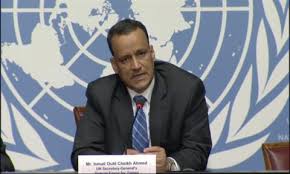
UN Appeals for Ceasefire as it Warns: Impending Famine in Yemen
Local Editor
The UN envoy for Yemen, Ismail Ould Cheikh Ahmed, on Wednesday urged an immediate ceasefire in the country as fighting pushed the poor Arab country closer to famine and deeper into humanitarian crisis.
Cheikh Ahmed said a ceasefire was a priority after reporting to the Security Council on his failed peace talks in Geneva in Switzerland recently last week.
"It is imperative for all the parties - and for me everybody is responsible - to find a truce," he told reporters.
He called for the ceasefire to take hold before the end of Ramadan on July 17.
Yemen is "one step" from famine, he warned, with 31 million people in need of humanitarian assistance compared with just 7 million two years ago.
He said also that the conflict has left 20 million Yemenis without access to safe drinking water and uprooted over one million people from their homes.
Some 80 percent of Yemen’s population - 21 million people - are in need of humanitarian aid and one million people have been displaced in the fighting, the envoy said.
A recent outbreak of dengue fever and fears that polio will return to the country are compounding concerns about the humanitarian emergency in Yemen.
Yemen slid deeper into turmoil when a Saudi-led aggression began launching air strikes backed by the United States in March.
Cheikh Ahmed stressed that there was no military solution to the conflict and said he would press on with his efforts to achieve a ceasefire and a return to political talks.
No date was announced for a new round of talks, however, the envoy is continuing consultations with all sides.
A Security Council diplomat separately said it was essential that Saudi Arabia lift its maritime blockade to allow life-saving supplies to reach Yemen.
"Yemen is so dependent on imports for food, health services, fuel," said the diplomat, who asked not to be named.
"There must be some lifting of this blockade so that ships can get through".
The diplomat also described prospects for a new round of political talks as "bleak."
A near-blockade of Yemen’s ports has made it very difficult to deliver humanitarian aid.
A Saudi-led coalition backed by the United States began carrying out airstrikes against Yemen since March 26--without a UN mandate, whereby the ongoing attacks on the country have killed more than 2,000 civilians, displaced more than a million and led to severe shortages of food, water, fuel and electricity.
